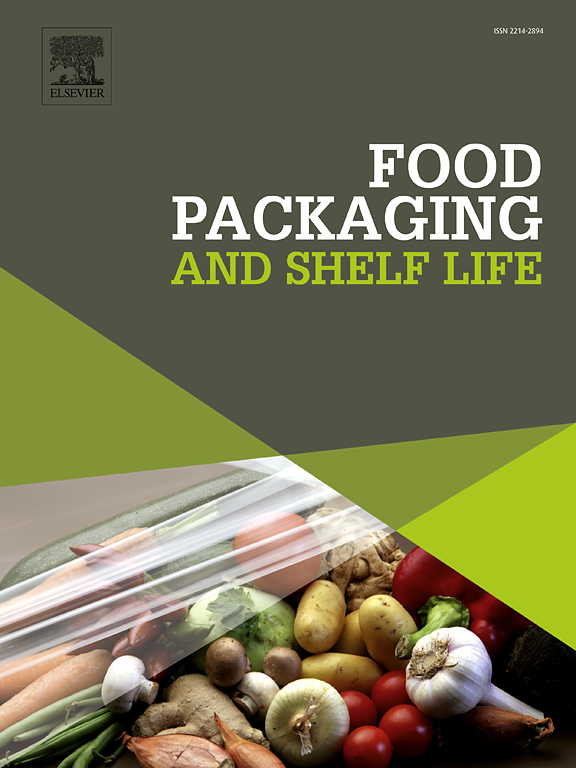用功能性深共晶溶剂/橙皮萃取体系改性聚琥珀酸丁二烯薄膜
IF 10.6
1区 农林科学
Q1 FOOD SCIENCE & TECHNOLOGY
引用次数: 0
摘要
开发具有增强功能特性的可生物降解包装材料对于食品的可持续保存至关重要。本文研究了用疏水深共晶溶剂(DESs)和橙皮(OP)提取物修饰聚琥珀酸丁二烯(PBS)薄膜以增强其抗氧化和抗菌性能。以麝香酚(Thy)和柠檬烯(Lim)与月桂酸(C12) (Thy:C12和Lim:C12)两种萜类化合物为基础,在不含和含OP提取物的情况下,对不同的PBS体系进行了理化、光学和生物活性的评价。与未改性的PBS(11.0 MPa和20.5 %)相比,改性后的PBS膜的抗拉强度(15.6 MPa)和断裂伸长率(32 %)均有所提高。水蒸气透过率(WVTR)降低,增强了阻隔性能。DES-OP的抗氧化活性(DPPH抑制)提高了24% %,抗菌实验显示对金黄色葡萄球菌的抑制区为17.2 mm。用食物垃圾中的疏水性DESs和OP提取物改性的PBS薄膜提供了具有增强生物活性特性的传统塑料的可持续替代品。未来的研究应集中在长期稳定性、生物降解动力学、工业加工方法和应用方面,以优化其在食品工业中的商业可行性。本文章由计算机程序翻译,如有差异,请以英文原文为准。
Poly(butylene succinate) films modified with functional deep eutectic solvent/orange peel extract systems
The development of biodegradable packaging materials with enhanced functional properties is crucial for sustainable food preservation. This work presents an investigation of poly(butylene succinate) (PBS) films modified with hydrophobic deep eutectic solvents (DESs) and orange peel (OP) extracts to enhance their antioxidant and antibacterial properties. Various PBS systems modified with mixtures based on two selected terpenes: thymol (Thy) and limonene (Lim) with lauric acid (C12): Thy:C12 and Lim:C12, without and with OP extracts, were evaluated for their physicochemical, optical, and bioactive properties. The modified films showed improved tensile strength (15.6 MPa) and elongation at break (32 %), compared to unmodified PBS (11.0 MPa and 20.5 %). Water vapor transmission rate (WVTR) was reduced, enhancing barrier properties. Antioxidant activity (DPPH inhibition) increased up to 24 % in DES-OP formulations, and antibacterial assays showed inhibition zones of 17.2 mm against Staphylococcus aureus. PBS films modified with hydrophobic DESs and OP extracts from food waste offer a sustainable alternative to conventional plastics with enhanced bioactive properties. Future studies should focus on long-term stability, biodegradation kinetics, industrial processing methods and applications to optimize their commercial viability in food industries.
求助全文
通过发布文献求助,成功后即可免费获取论文全文。
去求助
来源期刊

Food Packaging and Shelf Life
Agricultural and Biological Sciences-Food Science
CiteScore
14.00
自引率
8.80%
发文量
214
审稿时长
70 days
期刊介绍:
Food packaging is crucial for preserving food integrity throughout the distribution chain. It safeguards against contamination by physical, chemical, and biological agents, ensuring the safety and quality of processed foods. The evolution of novel food packaging, including modified atmosphere and active packaging, has extended shelf life, enhancing convenience for consumers. Shelf life, the duration a perishable item remains suitable for sale, use, or consumption, is intricately linked with food packaging, emphasizing its role in maintaining product quality and safety.
 求助内容:
求助内容: 应助结果提醒方式:
应助结果提醒方式:


